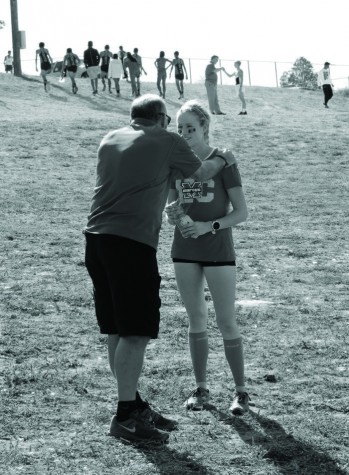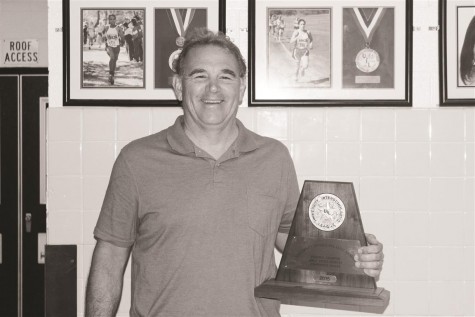Fourteen years ago when cross country and track coach Steve Telaneus suffered a heart attack at a meet, his chances of survival were slim.
For 33 minutes, no oxygen went to his brain. For 33 minutes, he was dead. Then his heart started again.
Now his story of recovery has been made into a documentary and shared throughout the community.When cross country news site Texas MileSplit was covering the school’s cross country team, some of the student’s parents shared Telaneus’ story with them. The documentary team approached Telaneus about telling the story about his heart attack and recovery. Initially, Telaneus was not taken with the idea. He didn’t see any value in rehashing past events.

“I’d rather stay out of the spotlight and let the people I coach get the credit,” Telaneus said. “They’re the athletes, they’re the competitors. That’s who’s more important.”
After setting some parameters, Telaneus agreed to do the documentary. As a captain, senior Payton Brown was interviewed. She said that Telaneus had discussed his heart attack with the team before.
“He would bring it up sometimes,” Brown said. “He would tell us about how hard it was with all of the brain damage. I guess for us we just wanted to accomplish the goal (winning state)more for him, just knowing how happy it would make him, knowing that he can be a good coach and he is a good coach.”
• • •
In 2002, Telaneus stood alongside his son as he cheered on his team. As he shouted words of encouragement, Telaneus collapsed.
A crowd gathered and found that his heart was not beating. An ambulance carried Telaneus towards the hospital, but his condition did not improve. His heart lacked a pulse and his brain was deprived of oxygen. As minutes ticked by, Telaneus’ chances of recovery dwindled.
In the ambulance, medics were able to locate a pulse, but Telaneus remained in a coma in critical condition. His wife thought she would have to make funeral arrangements. As his church began praying for him, Telaneus came out of his coma. He credits his recovery to those who prayed for him and his faith.
Although Telaneus survived, his recovery would be long and arduous. The lack of oxygen caused serious brain damage, affecting everything from his memory to his personality. When he returned to coaching, it was as if he had lost much of his experience. His brain damage had not only caused him to lose touch with his coaching style, but with his emotions as well. He found it difficult to empathize with his students.
Telaneus said that the first few years after the heart attack were the most difficult. The only way he could rebuild himself as a coach was by referring to old notes and records that he kept. While Telaneus was making progress with his physical recovery, he was unsure if he would ever be able to regain his old style of coaching.
“I’m still learning,” Telaneus said. “I’m not there yet, probably never will be there, but

I’m having fun.
• • •
In December, Heart of Marcus was released.
The documentary captured several moments that the team shared. Telaneus and Brown agree that one of the most emotional parts was when the girls won state in November. They initially thought that they had come in second for the second year in a row, but they soon realized that they had won.
“Honestly I started crying when I watched it again,” Brown said. “It was already hard to believe that we had won state because that had been our goal even since last year and so finally watching it and realizing that yeah we won state, it was just really fun, and I’m going to remember it for the rest of my life.”
The girls’ win at state has only made them work harder. They are motivated to repeat the series of wins that the school has seen in the past. Brown said though she is graduating this year, she is confident that Telaneus’ coaching style will lead to more victories.
“It just made all of us realize that we can accomplish all of the goals that we set,” Brown said. “For Coach T it made him realize that he can be as good of a coach as he wants to be.”
For Telaneus, hearing what his students had to say about him in the documentary was touching as well. Both Brown and another senior captain, Maddy Reed, said much of their drive to win came from their motivation to make Telaneus proud.
“It made me a little teary watching [the documentary],” Telaneus said. “I appreciate that a lot. I don’t want them to put that pressure on themselves. I was incredibly appreciative of them.”
Since the documentary was released, the community has given Telaneus its support. Telaneus said that several old friends reached out to him after its release.
“They just let me know that they were out there and they were supporting me and love me,” Telaneus said. “That was kind of cool to reconnect with some people.”
The team’s state championship demonstrates that Telaneus is regaining much of his coaching style, however he is unsure if he will ever return to his previous level. Since his heart attack, Telaneus continues to have residual problems, but finds support in his team, family and faith.
“I have circumstances in my life that are harder because of it, but it is what it is,” Telaneus said. “God is good, carried me before, carries me now.”







